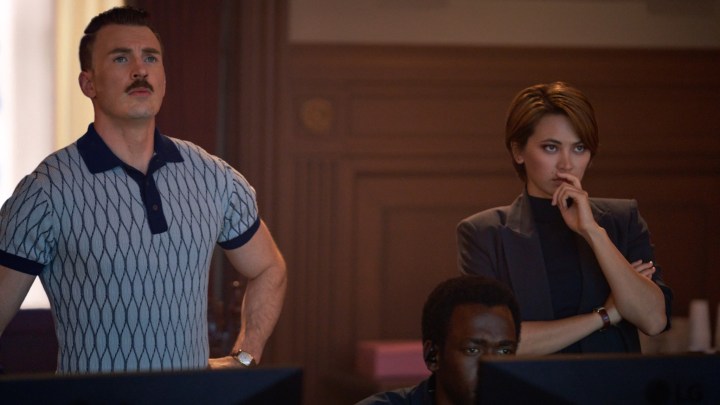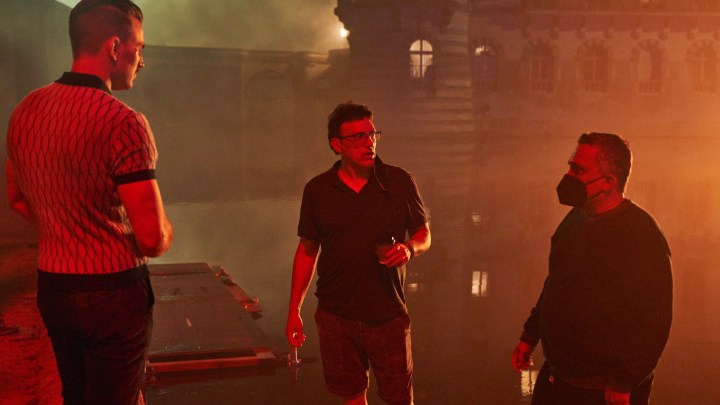There’s more to the Russo brothers than just flashy heroes in tight spandex. Apart from the Marvel movies that made them famous, the directing duo has intriguing ideas that often make their way into their films and a distinctive albeit uneven visual style that remains engaging nonetheless. Above all, the Russos have an eye for stylish and fast-paced action that recalls the gloriously over-the-top heights of the John Woo days of campy action cinema.
They might not be Kubrick or Godard — and let’s face it, they’ll never be — but they are not the sort of directors one discards like yesterday’s news. In fact, Anthony and Joseph Russo have the potential for greatness. Their films have personality and flair, a combo that, paired with their trademark use of energetic and hectic shots, achieves a sense of dynamism that few other directors can attain. Even better, they are not all style and no substance; the siblings make sure to imbue their sequences with as much character personality as possible. Yes, the Russos could be great, respected and daring directors recognized for their contributions to the blockbuster landscape, creating large-scale films that are ambitious yet commercially viable. But will they ever be?
They’re back with Netflix’s gargantuan production, The Gray Man, a film that carries a $200 million production tag, making it the streaming giant’s most expensive film. Still, that hard-spent money is nowhere to be seen in the film’s trailers, and if it’s there, it’s well-hidden behind layers of grey. The film looks ugly, that’s true, but there’s no denying the Russos’ gift for thrilling, elegant, and marvelously-executed action set pieces elevates it. The Gray Man should be solid confirmation that the Russos are capable of far more than anyone gives them credit for, so why is it so difficult for everyone to admit it? More importantly, why are the Russos themselves not living up to the flashes of greatness their films constantly show?
From small screen wunderkinds to MCU heroes

The Russos built their early career around comedy, directing memorable episodes of modern classics like Arrested Development, Community, and Happy Endings. They even won an Emmy for their work in Arrested Development‘s pilot, an episode whose reputation has somehow improved over the years despite being universally praised at the time. The pilot episode is sophisticated yet fast-paced, showcasing many of the Russos’ strengths as dynamic storytellers. These same strengths are puzzlingly missing from the siblings’ first commercial outing, You, Me, and Dupree, a film that’s so bad it’s best not to mention it ever again.
Still, the Russos had talent, enough to attract the attention of Marvel honcho Kevin Feige, who tapped them to direct the sequel to the underwhelming Captain America: The First Avenger. The Russos were an inspired if somewhat odd choice, but one of Feige’s greatest strengths has always been his ability to spot talent. His investment paid off, as the siblings took Marvel’s goody two shoes and turned him into the inspiring hero he was always meant to be.
Objectively speaking, Captain America: The Winter Soldier is still the best MCU film. It is the perfect blend of every small and big thing that makes a Marvel movie great, finding an equilibrium that few other entries in the sprawling cinematic universe achieve. Winter Soldier is fun and funny without ever sacrificing thematic heft for cheap humor; it is fast-paced and riveting without becoming over-indulgent with its action set pieces; it is sufficiently stoic to sell its freedom vs. safety plot without becoming overly dark or somber. Above all, it understands the characters at its center, using them not only to tell its story but to enrich its action sequences.
Perhaps that is the Russos brothers’ greatest strength. They understood who Captain America was and successfully translated his by-the-book persona into the action genre’s language. We can tell that Steve is Cap in and out of the uniform. His personality comes across loudly and clearly, whether he’s delivering one of his semi-condescending speeches or throwing punches at Brock Rumlow. Winter Soldier‘s action scenes are graceful while remaining ruthless. They are hectic and desperate, conveying a sense of realism that no Marvel film had had up to that point.
The Russos changed the Marvel Cinematic Universe by delivering a superhero film that dared to be something more than a straight-up comic book adaptation. Like Christopher Nolan before them, the siblings mixed genres, creating a spy story posing as a superhero tale. Winter Soldier has layered and, dare we say it, weighty themes that pose genuine questions about the power institutions hold over civilians’ lives. The film was unpresumptuous yet confident, successfully presenting its ideas without beating the audience over the head with them.
Logically, Feige booked them for a third Captain America film and to helm the ambitious Avengers crossovers after he-who-must-not-be-named became disenchanted with the franchise following the disappointing Avengers: Age of Ultron. But the Russos’ magic relied on their freshness, the innovation they introduced into the MCU. Replicating it in future projects cheapened it, and soon, their style wasn’t a welcome change of pace but the franchise’s norm. By the time Endgame arrived, the Russos were as intrinsic to the MCU as Feige himself.
A sour Cherry

Let’s get this out of the way: Cherry is bad. Genuinely and unapologetically bad, despite the Russo brothers’ best intentions and Tom Holland’s committed performance. The film is stylized to the point of ridicule, mainly because the Russos still seem to be in escapism mode. And considering this is supposed to be a jarring tale of addiction and PTSD, escapism isn’t exactly the angle we’d choose. It doesn’t help that Holland is arguably miscast in the role, struggling in a role that his agent probably thought would help him escape the clumsy teenager image crafted by the Spider-Man films.
There’s something of value hidden within Cherry‘s abundant layers, yet the Russos can’t look past their own paraphernalia to search for it. The film is most comfortable in the war scenes, where the siblings’ penchant for dynamic storytelling takes center stage. Still, it isn’t enough to save it from its own devices. Cherry often feels like the youngest child trying on an older sibling’s clothes and putting on a deep voice to try and act like a grown-up. Everything, from the bizarre and often laughable editing choices to the blundering script, contributes to creating an environment of chaos that stifles the story.
Above all, there’s a certain desperation to Cherry. It is a clear attempt by a couple of directors and an actor to break away from the superhero images that have become so ingrained in their personas. The story is jarring and blunt, the sort of in-your-face vehicle that might’ve granted Oliver Stone and River Phoenix Oscar nominations in the early ’90s. However, it becomes less serious in the Russos and Holland’s hands, not because of their connection to Marvel but because of their inexperience with a genre that demands a level of intensity they cannot convey.
Back to what works

With The Gray Man, the Russos return to familiar territory. It’s a massive production with major stars on the lead and a powerful studio backing it up. The plot is everything one might expect from a $200 million Netflix production, but the selling point here is the Russos and the two leading men at the center of the action, Ryan Gosling and Chris Evans.
On paper, The Gray Man might seem like a paycheck gig — it almost certainly is for Gosling and Evans. However, the Russos have more at stake here; this film is about going back to basics and proving they are still major players in the Hollywood game, especially after the Cherry debacle. The Gray Man is their chance to prove they remain bankable and viable options for any studio’s tentpole; in that sense, they seemingly succeeded. The early reviews are a mixed bag so far, even if the positive ones seem to consider the film “decent” rather than “great.”
And what a shame, because the Russo brothers could be great. Their action sequences have enough style to rival John Woo and are vigorous enough to go toe-to-toe with famed stuntman Chad Sahelski. They care deeply about their characters — their empathy towards Holland’s Cherry is apparent even during the film’s weakest points. They are clever visual storytellers, using quick yet technical shots to convey their message. Hell, Vulture once unironically called them “the future of Hollywood.”
They could be. The Russos could join the wave of auteurs making their way to major franchises and producing gripping and thought-provoking blockbusters — Dune, The Batman, even Top Gun: Maverick. And they need to, now more than ever. We are living at a transition time for cinema; the battle against streamers rages on, and Hollywood is abandoning the theater experience for the benefits that streaming services offer. Critics, fans, and everyone in between question whether original directors still have a place in blockbuster filmmaking while the battle for Hollywood’s soul rages on, with studios using franchise success as their weapon of choice.

The Russo brothers have the potential for light and dark. They can either become a positive force for change in a business that constantly sacrifices artistic freedom in favor of formulaic structure or succumb to the Hollywood machine and become that which they once swore to destroy. Films like Winter Soldier and even Cherry show a willingness to experiment and step out of their comfort zone. Unfortunately, The Gray Man seems to be more of the same, a compromise of creativity in favor of security.
Still, the film’s purpose was to get the brothers back on track, and it seemingly did. If everything goes well, the Russos will have another healthy amount of goodwill to spend how they like. In all honesty, we wouldn’t mind them making another Cherry as long as they learned from their mistakes. It’s the time to experiment, to think big and outside the box, to take risks and reap the rewards. However, if the Russos follow The Gray Man with The Pale Man or another by-the-numbers action flick, it’s game over for their career as auteurs in the making. No pressure, I guess.
Editors' Recommendations
- Iron Man 3 is the most underrated MCU movie ever. Here’s why it’s worth watching
- 7 sci-fi movies that have great endings
- Can the MCU ever pull off another Avengers: Infinity War cliffhanger ending?
- The best Ant-Man villains, ranked
- The 5 best comic book sequels ever, ranked




